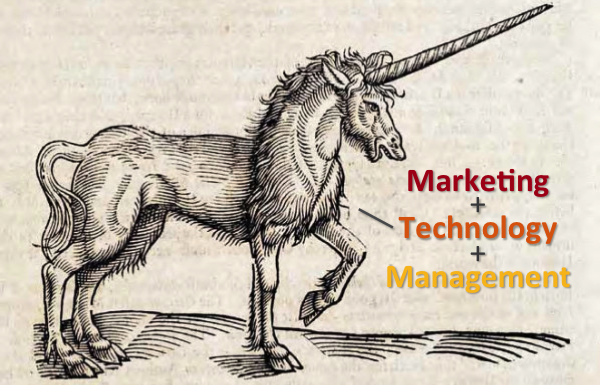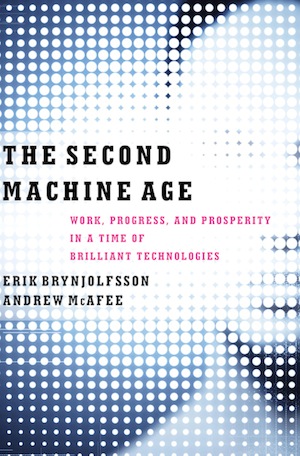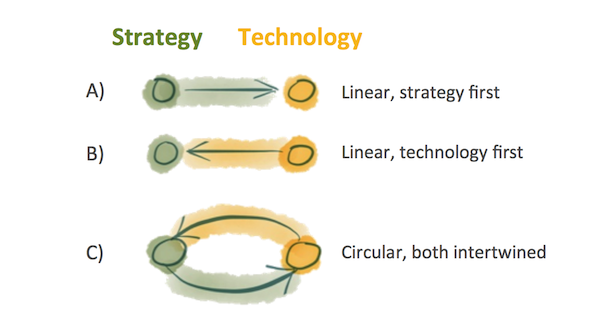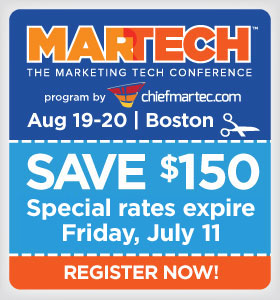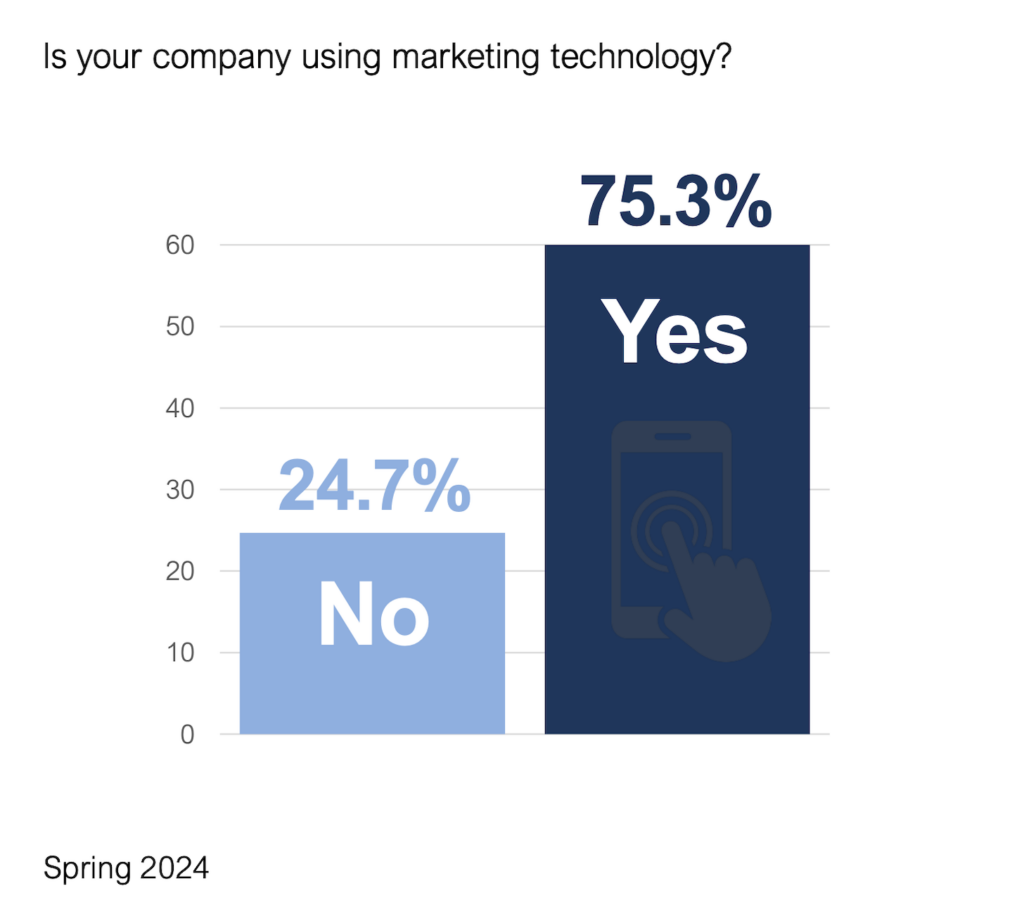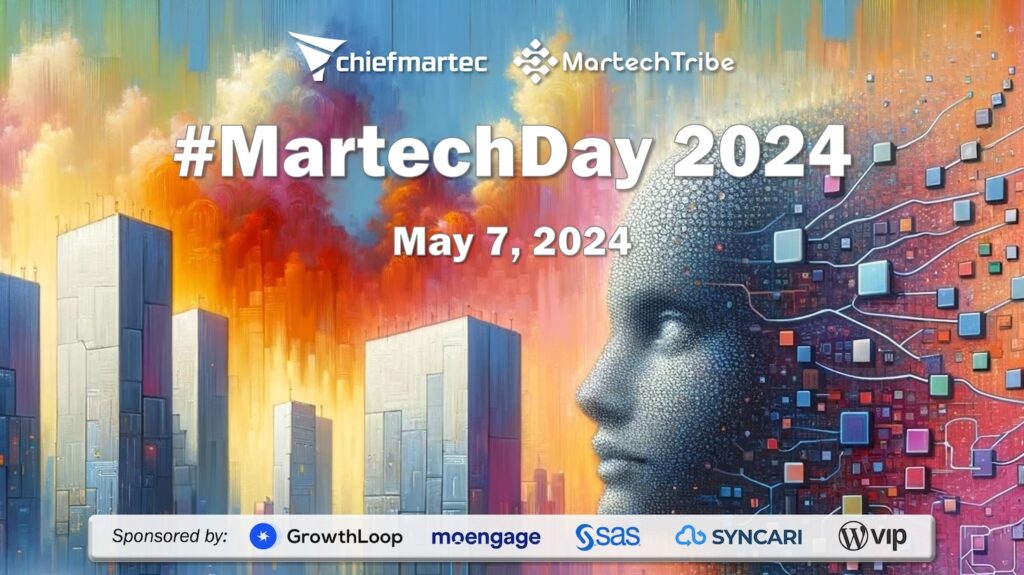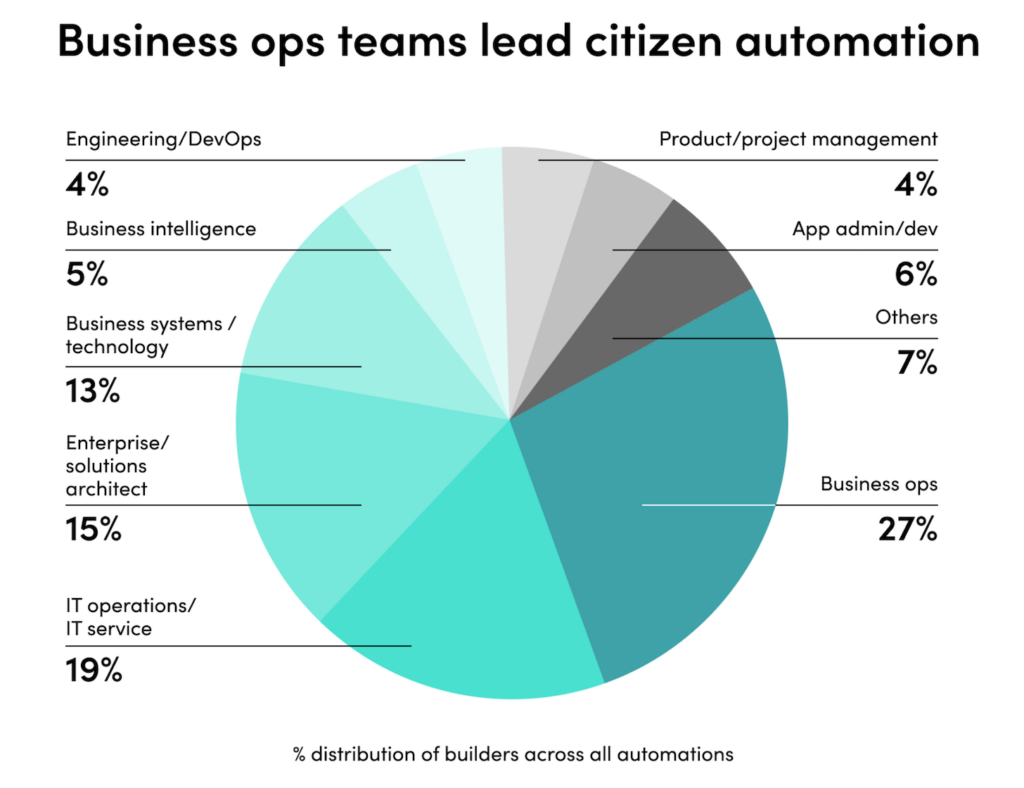In six weeks, MarTech: The Marketing Tech Conference will have its inaugural event. And while this may sound like a little hype — you’d think I worked in marketing — I can confidently say that this will be unlike any other marketing conference the world has ever seen.
For those of you who are coming, I’ll describe what you can expect. And if you haven’t registered yet, I hope this may tempt you to join us — along with the incentive that you only have until this Friday, July 11, to register at the “beta” discount rate.
MarTech: Festival of the Unicorns
What makes MarTech unique? Primarily we’ve designed a conference for people who are at the nexus of marketing, technology, and management. When people outside this field hear that combination, they’re often skeptical. Tech people who intuitively get marketing? Marketers who are fluent in technology? And they manage and lead teams? Sounds like a unicorn! Good luck finding such mythical creatures.
Well, we might as well rename this conference MarTech: Festival of the Unicorns, because we’re going to have several hundred of them convened together. They exist! I’ve seen them register by the dozens, with titles such as head of global digital marketing operations, vice president of marketing technology, director of marketing transformation and operations. This audience — hopefully including you, dear reader — is the core of what makes MarTech unique.
In turn, this exceptional audience enables us to deliver a one-of-a-kind agenda. We can dive into meaty technical topics, not merely skim them with buzzwords du jour. Yet we can do this in the context of strategic marketing issues and digital business transformation. We can focus on understanding the why of marketing technology innovations, empowered by the knowledge of the what and the how. Most importantly, we can tackle the biggest challenges with such technology: managing the changes required in people, process, and structure to harness these capabilities in complex, real-world organizations.
We’ve sought out 25 of the world’s most engaging thought leaders and star practitioners at this intersection to share their best ideas and experiences with you over a packed, two-day agenda. Most sessions will be keynote-level presentations or intense 20-minute TED-style talks by individuals — with moderated Q&A by yours truly — interspersed with a few intimate “fireside chat” discussions with small groups of stellar executives in this space. I am incredibly grateful for the amazing speakers who have committed to this event. These are some of the people I admire most in the industry, and it’s both humbling and electrifying to have them share their passion and intellect at MarTech.
But first, a few words about unicorns.
Yes, up until this point, hybrid marketing/technology executives were rare. But that’s because our frame of reference was from another era. For decades, people who worked in IT or software engineering were separated — both physically and mentally — from the marketing department. They were unrelated fields, and businesses operated fine with them working in disparate silos. There were few opportunities for cross-pollination, and frankly, little need. To find someone who truly understood both worlds was a black swan.
However, the world has changed. Radically. Intuitive understanding of the interplay between technology and marketing is the very engine of innovation that drives the Internet. It’s built all the giants of this new era: Amazon, Google, eBay, Facebook, LinkedIn, Twitter. Even non-commercial ventures, from Wikipedia to an abundance of open source projects, have thrived at the intersection of enabling technology and human dynamics. This new world belongs to those who synthesize both halves of that combination into ideas born in this junction.
Finding and Growing Marketing Technology Unicorns
While marketing technologists are still a relatively small professional group, they are multiplying rapidly because of two symbiotic forces in supply and demand:
- An explosion of opportunities for the budding supply of hybrid marketing technologists to practice their craft, hone their skills, and acquire valuable experience.
- Skyrocketing demand for marketing technologists — they are the carpenters of digital marketing, and building a digital business that has a solid foundation and a sturdy frame requires carpenters.
Marketing technology is a new profession. It wouldn’t have made any sense as a career 20 years ago. But today it is becoming one of the hottest fields in the market. It’s not an easy line of work, mind you, requiring a mix of left brain and right brain aptitudes that not everyone possesses. But for those who have the talent and the interest to pursue this space, the opportunities are plentiful.
You’ve heard of technological unemployment — the obsolescence of an entire profession due to new technologies (media buyers, take note). One of MarTech’s featured speakers, Erik Brynjolfsson — co-author of The Second Machine Age and Race Against the Machine — has studied technological unemployment carefully, but he argues passionately that there is also a counterbalancing force: technological employment.
New technologies don’t just destroy old jobs. They create new ones.
Just as my parents could have never imagined the kind of work I do for a living when they were growing up, I’m quite certain that my daughter will have career options that I can’t even conceive of today. That’s technological employment.
Marketing technologists are a shining example.
The fact that marketing technologists didn’t exist as a cohesive profession until quite recently is not predictive of how big this field will become. Before the invention of flight, careers for aeronautical engineers, pilots, and air traffic controllers didn’t exist either. New technologies create new careers. And while the marketing technologists of today are pioneers, there will be tens of thousands of them entering this field in the years ahead.
Erik’s talk on Shaping the Future of Business in The Second Machine Age will be the opening presentation on Day 2 of MarTech, and it will help frame the big picture in which this new profession of ours is emerging.
But in these formative years, how do companies find — or develop — marketing technology leaders? This is the first major theme of MarTech.
Sheldon Monteiro, CTO of SapientNitro, who will follow Erik on Day 2, will give a talk on Growing Unicorns: SapientNitro’s Chief Marketing Technology Officer University that reveals how his company — one of the largest digital agencies in the world — has constructed an executive development program to quite literally grow their own unicorns. They take promising engineers and systems architects who are passionate about the business side of technology and give them an intensified, global education in tech-savvy marketing leadership.
The success of their program — and the repeatability of its formula — demonstrates that professionals in this field are not just the product of happy accidents. There is an underlying structure to the skills and mental models of marketing technology management, and by understanding it and teaching it, we can systematically scale this discipline.
Have less time or patience for growing your own? Erica Seidel, a leading recruiter and former analyst who specializes in placing analytical and technical marketing executives, will give a talk on Day 1 on The Talent Land Grab in Marketing Technology: How to Win that will share her research in finding and recruiting marketing technologists from both traditional and more unorthodox sources. I’ve found her insights on talent acquisition and retention in such a highly competitive environment invaluable.
Marketing Technologists at the Epicenter of Business Transformation
The second major theme of MarTech is digital business transformation.
What makes marketing technology leadership so exciting — and challenging — is that it’s not simply implementing well-defined playbooks of proven strategies in long-established organizational structures. Digital marketing is the vanguard of digital business transformation, and marketing technologists are the calvary in that forward charge.
The opening session on Day 1 of MarTech will be Growing Business with Marketing Technology: From Operations to Innovation, a talk by Mayur Gupta Global Head of Marketing Technology and Operations at Kimberly-Clark and a member of MarTech’s advisory board. Mayur — the epitome of a chief marketing technologist, who was recently featured in Harvard Business Review — has been one of the leading champions for this new profession. An alum of SapientNitro, he’s designed and operationalized marketing technology capabilities worldwide for a Fortune 500 B2B and B2C product organization. He’ll relate his story of how they architected that, share the frameworks he has developed for managing such transformations, and discuss the critical shift from marketing technology as an operations capability to a driver of innovation.
Following Mayur’s talk, Laura McLellan the VP of marketing strategies for Gartner’s CMO practice and my co-author of that HBR article, will present her research on how Chief Marketing Technologists Symbolize Marketing’s Changing Role. Laura is the brilliant analyst who foresaw the huge shift in technology power and responsibility to the CMO. She’s spent years studying the roles of marketing technology executives and their impact on businesses, tallying their effect on everything from budgets to innovation programs. She’s examined how this fundamentally alters marketing’s relationships, externally with customers and internally with IT, sales, and the CEO. At MarTech, she’ll be sharing some of her latest research — and given her prescient ability to detect early trends in this space, this will be information you won’t want to miss.
Later on Day 1, Paul Roetzer, the CEO of PR 20/20 and author of the books The Marketing Agency Blueprint and soon-to-be-released The Marketing Performance Blueprint, will distill his plan for the transformation of digital marketing that has helped dozens of his clients adapt to this new world, the subject of his latest book. His first book actually tackled the remaking of marketing agencies to support such client transformations — he’ll share his perspective on both sides of the modern marketing service relationship.
On Day 2, Forrester VP and principal analyst Sheryl Pattek, who works with CMOs on digital transformation will step back from the technology facets of this metamorphosis to focus on Making Marketing Thrive in the Age of the Customer. Having studied many of the world’s leading brands and how they successfully engage with digitally empowered buyers, she’ll detail the technology-powered best practices of marketing organizations who excel. These are the business imperatives that marketing technologists are charged with enabling.
Later on Day 2, Michael Krigsman and Vala Afshar — the dynamic duo of the popular CxO Talk podcast that has become famous for its lively, probing interviews with CMOs and CIOs — will enact their show live on the MarTech stage on the topic of CMO Perspectives on Digital Transformation. Their guests will be two highly respected CMOs who are at the forefront of digital marketing leadership: Steve Mann, the CMO of LexisNexis, and Robert Tas, the CMO of Pegasystems. Michael and Vala have become renown for candid interviews that cut to the tricky issues that are too often glossed over — yet they do this with humor, warmth, and wisdom that makes their shows immensely entertaining and wonderfully educational. Think Richard Feynman crossed with Jerry Springer in a collision between marketing and IT. My chat with them earlier this year inspired the post 10 things I hate about narrow CIO vs. CMO arguments.
New Ways of Thinking About Marketing Management
They say that genius is 10% inspiration and 90% perspiration, and surely the same ratio holds true for digital transformation. When you come down from the 50,000-foot view of how marketing is changing, you find yourself confronting the challenges of rewiring how organizations think and behave. This has been a subject that I’ve been deeply passionate about — the evolution of marketing management — and we’ve invited some of the industry’s most preeminent experts to cover this as the third theme of MarTech.
First up, Jascha Kaykas-Wolff, the CMO of BitTorrent, will address the audience on Agile Marketing: New Ways of Managing a New Era of Marketing. I’ve been an advocate of agile marketing for many years — see Everything You Wanted to Know About Agile Marketing (But Were Afraid to Ask) — but Jascha is the true trailblazer. He first introduced agile marketing to his organization as the CMO of Webtrends, and then as the CMO of Mindjet. Now at BitTorrent, he’s leading in an environment where the entire company is being run on agile principles and methodologies. His experience with the interplay between agile management and digital marketing is unparalleled. If you want to learn about the state of agile marketing from the authoritative source, Jascha’s your man.
Later on Day 1, Jane Hiscock, the CEO of Farland Group and a member of MarTech’s advisory board, will host a fireside chat on Data: The Future of Marketing — Is Your Organization Ready with Wes Hunt, the chief data officer of Nationwide Insurance, and Lisa Ritchie, the senior VP of customer insights and analytics at Scotiabank. Data-driven marketing and marketing technology are deeply intertwined, and this session will zoom in on the three greatest challenges and opportunities that data — including, yes, big data, albeit without the hype — dangles in front of CMOs and the marketing technology leaders who support them: segmentation, attribution, and ownership. Jane’s advised CMOs of some of the largest companies in the world on these issues, so this is sure to be a riveting discussion.
Kicking off the afternoon of Day 2, we’ll have a trio of sharp TED-style talks on other critical aspects of modern marketing management:
Jason Heller, CEO of Agiliti, will present The New Marketing Operations Archetypes: What Works and Why. Jason has consulted for many leading brands on how to restructure people, culture, processes, systems, and partnerships to operationalize digital transformation. He’ll highlight the pitfalls to avoid and provide best-in-class examples of how enterprises are successful reinventing marketing operations. Hint: it’s not just about adding budget and headcount to a legacy org structure.
Sean Ellis, CEO and co-founder of Qualaroo and the popular GrowthHackers.com online community, will present Growth Hacking: The Human “Operating System” for Marketing Technology. Growth hacking has exploded as a metaphor and a methodology for performance-based marketing in a digital environment. Sean is one of the architects of that movement — in fact, he is the guy who coined the term “growth hacking” from his breakthrough work at growing Dropbox, LogMeIn, Uproar, and Eventbrite. Every marketing technologist should strive to be well-versed in the concepts Sean will cover.
Christopher Penn, VP of marketing technology at SHIFT Communications, will present Algorithmic Thinking: The Foundation of Marketing Technology. Chris has been one of the earliest champions of the intersection of marketing and technology — his popular podcast Marketing Over Coffee has covered the subject for years. He’ll give a talk that, in my opinion, cuts to the very soul of technology’s impact on marketing management: the rise of process as the ultimate expression of marketing strategy in a digital world. This is why marketers should learn how to code! Chris will teach the audience three core frameworks for re-interpreting any marketing or business problem as an algorithm and creating solutions that are reliable, scalable, and agile.
Marketing Technology Strategy — The Kung-Fu of Modern Marketing
The fourth major theme of MarTech is technology strategy in the context of marketing. To me, this is one of the most critical responsibilities of a marketing technology leader. As I wrote in a post earlier this year, I believe that strategy, technology, and marketing are all intertwined — model “C” in the diagram below:
On the morning of Day 1, David Raab, Principal at Raab & Associates and a member of the MarTech advisory board, will present on How to Align Marketing Technology with Business Strategy. David is one of the smartest people I know when it comes to marketing technology — his comparative analyses of marketing automation, demand generation, and customer data platforms are the best in the industry. In this session, however, David will help the audience rise above the “tech specs” to tackle the connection between system decisions and business goals. He’ll describe a step-by-step process for linking the two and evolving marketing technology goals to marketing technology methods. For a preview of his talk, read his post on Matching Marketing Technology to Business Strategy: A Starting Framework.
Towards the end of Day 1, Travis Wright, the CEO of MediaThinkLabs — a marketing technology consultant and a stand-up comic, which I think is a brilliant combination — will tackle the specific strategic question of To Build or Buy Your Own Marketing Cloud? This is a question that every marketing technology leader must face — architecting around one major vendor or taking more of a portfolio approach to their systems with their own glue. Travis will cover pros and cons to both approaches, and highlight some of the tools that can expand the range of choices you have for each.
Travis’s session will be followed by a very special panel that I will moderate with Suresh Vittal of Adobe, Erik Holt of IBM, and Lou Pelosi of Marketo on Growing ISV Ecosystems for Marketing Software Platforms. I am a big believer in the power of open marketing platforms that not only enable but actively encourage third-party products being plugged into their backbone. To me, this is the only way to make a landscape of 1,000 marketing technology vendors manageable — to turn that explosion of innovation from a bug into a feature (to use a little software parlance). In this session, we’ll hear from three of the leading platform vendors on the issues and challenges of building and harnessing these powerful ecosystems.
On Day 2, Shawn Goodin, the director of marketing technology at The Clorox Company and another quintessential chief marketing technologist who was highlighted in that HBR article, will circle back on digital transformation with a TED-style talk that emphasizes its implementation in the trenches: Marketing Technologist as Marketing Transformation Sherpa. Shawn has extensive experience in marketing technology leadership at major consumer brands, and he will share his approach to marketing capability mapping that boils “transformation” down into a systematic conquering of organizational competencies.
Saving the best for last, we’ll close MarTech with a fireside chat between myself and Dharmesh Shah, co-founder and CTO of HubSpot, author of the bestselling book Inbound Marketing (in fact, he’s the guy who invented inbound marketing), and publisher of the immensely popular blog OnStartups.com. Our session will be titled The Engineer Who Hacked Marketing.
I’ve known Dharmesh for almost 10 years, since we were in the same class of Sloan Fellows at MIT. It’s been enthralling to watch him grow HubSpot from a concept on a whiteboard to a major software company and the leading brand in inbound marketing — he and his team have had a tremendous impact on the evolution of marketing as we know it.
In this chat, we’ll cover a bit of the story of how HubSpot got started — the best example of an engineer “cracking the code” of marketing and turning it into a repeatable, software-mediated solution that you’ll find anywhere — and talk about how Dharmesh views technology strategy through the lens of a platform provider. Dharmesh is also a prolific angel investor in start-ups, and so we’ll get his take on some of the exciting ideas that he sees emerging in new marketing technology ventures and how he evaluates their potential.
Dharmesh agreed to do this only on the condition that he could ask me questions in turn, so there may be a few surprise topics that arise — a surprise to me as much as you quite possibly — so this should be a fun way to close out the conference.
Join Us at MarTech and Connect with Your Peers
I’ve just scratched the surface of what these amazing speakers will be sharing at MarTech, but hopefully this gives you a good taste of what to expect with these four themes:
- The new profession of marketing technologists, their role and impact.
- Marketing technology and digital business transformation.
- New methods of marketing management enabled (and mandated) by technology.
- Technology strategy for marketing — from the view of both brands and vendors.
More than anything, however, I believe the best “feature” of this conference will be the opportunity to meet and talk with hundreds of other marketing technology leaders like yourself.
The “beta” discount rate expires this Friday — and, in fact, the hotel has already sold out, so we’re expanding lodging to other nearby hotels — so register now. I look forward to the opportunity to see you at the conference!
